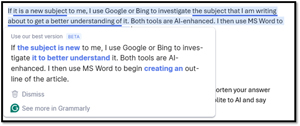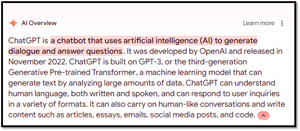In-Depth
How AI Helps Me Write
The other day, I was talking to a friend of mine about AI in general, and she seemed surprised when I told her how much I use AI in my writing. I think she assumed that I used ChatGPT or some other generative AI program to magically create my articles, which couldn't be further from the truth, but I do use AI daily to assist with my writing.
Although AI is strong and getting stronger all the time, I am not particularly worried about AI taking over writing. I figured this conversation would be a good segue into how I use various tools when writing an article and how AI fits into this workflow.
When starting a new article, if the subject is new to me, I use Google or Bing to send me to web sites where I can investigate the subject to understand it better. Both tools are AI-enhanced.
I then use MS Word to begin creating an outline of the article. MS Word is good at detecting misspelled words (I am a horrible speller) and punctuation, and I find its text completion function useful.
I have always struggled with the nuances of the English language. Don't get me wrong; I have a very good vocabulary, but I still struggle with some of the mechanics of English. Don't even get me started on hyphenated words and homophonic words. Due to this, I have nothing but respect for English majors and the editors I have worked with. How they can keep up with all the conflicting rules of English is beyond me. To help them out, I run Grammarly in the background.
Grammarly reviews spelling, grammar, punctuation, and other mistakes in your writing and makes suggestions for it. For example, it suggested the following in the second paragraph of this article:
 [Click on image for larger view.]
[Click on image for larger view.]
Although I don't use all of Grammarly's suggestions, I review them as it does a great job flagging problematic chunks of text. Grammarly is not perfect, but it is very good at detecting obvious errors in my writing. According to its web site, it is a generative AI writing assistant.
One of the last things I do before shipping off my work an editor is to read it aloud to me. This is a trick that my wife taught me. I find this invaluable as I often read what I thought I wrote rather than what I actually wrote. I use MS Word's built-in text-to-speech function. Not all versions of Word have it. To access it, go to Review > Read Aloud.
 [Click on image for larger view.]
[Click on image for larger view.]
Although Microsoft doesn't specify that it uses AI when generating text-to-speech, I am willing to bet that the backend does use it to understand the nuances when speaking correctly.
As a side note, there are other text-to-speech engines, and I am currently investigating Amazon Polly for text-to-speech conversion and how it works.
 [Click on image for larger view.]
[Click on image for larger view.]
Let's talk about ChatGPT, the 500-pound gorilla in the room (AI isn't very good at catching mixed metaphors). I will use ChatGPT for the rest of this article, but it also refers to many other generative AI products.
So, what is ChatGPT? I figured it wouldn't be right to ask ChatGPT for a definition as it may be biased, so I asked one of its competitors, Google AI, and this is what it came up with. "ChatGPT is a chatbot that uses artificial intelligence (AI) to generate dialogue and answer questions."
 [Click on image for larger view.]
[Click on image for larger view.]
So, on the surface, it would appear that using ChatGPT would allow me to ask it a few pointed questions, and my articles would be automatically created! The problem with this is that it is a generative AI product. It can only reformat and regurgitate existing information and does not generate new insights or form new opinions on a product or subject. This can lead to a self-confirming bias where multiple articles are generated using the same source material, with only slight modifications. Then, these are used by generative AI to bolster the options, right or wrong, in the original article and give it more credence.
I have also found that ChatGPT's writing has a distinct tone and tends to use far more flowery language than I prefer in my articles.
I am not saying that products like ChatGPT are not useful. In fact, in many cases, they can be useful when composing articles, but for the type of work I do, they aren't that useful.
I guess the gist of my discussion with my friend, which is the subject of this article, is that, yes, I find AI invaluable for assisting in the writing of my articles, but not for writing them themselves.
About the Author
Tom Fenton has a wealth of hands-on IT experience gained over the past 30 years in a variety of technologies, with the past 20 years focusing on virtualization and storage. He previously worked as a Technical Marketing Manager for ControlUp. He also previously worked at VMware in Staff and Senior level positions. He has also worked as a Senior Validation Engineer with The Taneja Group, where he headed the Validation Service Lab and was instrumental in starting up its vSphere Virtual Volumes practice. He's on X @vDoppler.